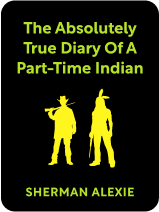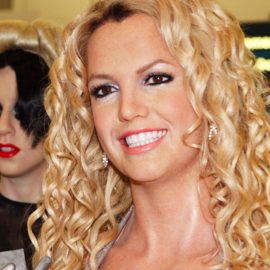

This article is an excerpt from the Shortform summary of "The Absolutely True Diary of a Part-Time Indian" by Sherman Alexie. Shortform has the world's best summaries of books you should be reading.
Like this article? Sign up for a free trial here .
Who is Arnold Spirit Jr.? What is the book The Absolutely True Diary of a Part Time Indian about?
Arnold Spirit Jr. is the main character of The Absolutely True Diary of a Part-Time Indian. Arnold Spirit Jr., who often goes by Junior throughout the novel, is a teenager who branches out from his reservation to attend a nearby school.
Keep reading to find out who Arnold Spirit Jr. is and more about his story.
Arnold Spirit Jr.
Narrator Arnold Spirit, Jr (Junior) was born with too much cerebrospinal fluid in his brain, which he initially describes as a brain drowning in grease. But because this makes his brain sound like a big French fry, he decides it’s more poetic to say that at birth, he had “water on the brain.”
At six months old, Junior had a surgery in which the extra fluid was sucked from his brain. His doctors predicted he’d live as a “vegetable” if he didn’t die during surgery, but he survived with only relatively minor problems relating to his brain damage. These include:
- Nearsighted vision in one eye and farsighted in the other
- Seizures
- A stutter and lisp
- 42 teeth (most people have 32)
- A huge skull
The extra teeth cause particular problems. When Junior’s teeth get so crowded he has trouble closing his mouth, he goes to the Indian Health Service. The Indian Health Service only does this kind of work once a year, so Junior has to get all ten extra teeth pulled at once. Further aggravating the situation is the fact that the white dentist apparently doesn’t think Indians feel as much pain as white people, so he only gives Junior half the Novocain.
Junior’s large head also causes issues. Bullies on the reservation call him “Globe”: They grab him, spin him around, and put their finger on his head, saying, “I want to go there.” Due to Junior’s physical challenges and speech impediment, people on the reservation regularly beat him up and refer to him as a “retard.”
Cartoons
Junior spends most of his time at home drawing cartoons. There are many reasons he loves to draw:
- Drawing at home is safer than being outside.
- Drawing is a more dependable and universal language than words. Only certain people understand particular languages like Spanish and Chinese. But everyone understands drawings.
- Drawing brings Junior hope. While most of the time he feels like a “zero” on the rez, he feels important when he’s drawing. Junior thinks he might be a famous artist one day. He believes his art could be his ticket to a better life.
The End of Summer
Junior says that most people think the worst thing about being poor is being hungry. He acknowledges that sometimes, he and his family go upwards of 18 hours without eating because they don’t have the money for food. But Junior always knows that eventually, one of his parents will come home with KFC. And KFC tastes even better when you’re hungry.
Junior sometimes wants to blame his parents for their poverty, but he knows he can’t. He knows his family’s poverty is not his parents’ fault, and he knows they dreamed of more. But no one on the reservation realizes their dreams. They don’t get the chance. They’re too poor. And that creates a cycle that’s hard to escape.
- First, you believe you’re poor because you’re stupid.
- Then, you believe you’re stupid because you’re Indian.
- Finally, because you’re Indian, you believe you will always be poor, and the cycle repeats itself.
Poverty doesn’t make you strong or perseverant. Poverty just “teaches you how to be poor.”
Oscar
For Junior, the worst thing about being poor isn’t hunger. It’s the inability to save his best friend, his dog Oscar. When Oscar gets sick, Junior begs his mom to take Oscar to the vet, but the family doesn’t have the hundreds of dollars needed for the operation. Junior promises to get a job to pay the vet, but he knows that employment options for Indian boys are few: He’s too young to work at the reservation casino and there aren’t many lawns on the reservation to mow. Helpless, Junior lays next to Oscar for hours, petting him and whispering to him.
When Junior’s dad comes home, he gets out his rifle and bullets and tells Junior to take Oscar outside. At that moment, Junior simultaneously hates and deeply appreciates his father. Junior knows his father doesn’t want Oscar to suffer. Junior sees that his dad is crying, and Junior knows that he can’t blame his father for the poverty that’s forcing them to end Oscar’s life this way. Vet visits are costly, but bullets only cost two cents.
When Junior takes Oscar outside and tells him that he loves him, Oscar seems to understand what’s happening and looks relieved to be put out of his misery. As Junior’s dad prepares the rifle, Junior runs away as fast as he can, but he can’t outrun the speed of sound—so he hears the shot that kills his best friend.
Early Fall
When his parents get home, Junior asks them, “Who has the most hope?” His parents look uneasily at each other, unsure of how to answer, but when Junior asks again, they say, at the same time, “white people.”
Junior knew they’d say that. Now he knows for sure where he and his hope need to go: to Reardan, the rich, redneck, racist farm town where the white kids go to school.
For a kid on the rez, saying, “I want to go to Reardan” is like saying, “I want to fly to the moon.” No one leaves the reservation, certainly not to go to another school, and certainly not a white school. But Junior’s parents put up little resistance. Even though Junior’s dad once got pulled over in Reardan three times in one week for DWI (Driving While Indian), Junior’s parents know Reardan is one of the best schools in the state. They suggest he wait until the following school year, but Junior insists that if he doesn’t start the following day, he never will. Junior’s parents agree. It’s as if they’ve been waiting for Junior to ask to go to Reardan. Like Mr. P, they see their son’s potential and don’t want him to end up drunk and impoverished like the rest of the Indians on the rez.
Saying Goodbye
The next day, Junior walks to his old school to tell Rowdy that he’s switching schools. Rowdy is alone on the playground because all the other kids are afraid of him.
Junior wants to tell Rowdy that he loves him, but he knows that boys aren’t supposed to say those kinds of things to each other and also that Rowdy would hate it, so he gets straight to the point and tells him that he’s transferring to Reardan.
At first, Rowdy thinks Junior is joking, and he doesn’t think it’s funny. When Rowdy realizes Junior is serious, he mocks him and says he’ll never go because he’s too much of a “wuss.” Although Junior knows Rowdy well and, therefore, should know better, Junior makes two critical mistakes at this moment:
Mistake #1: When Rowdy turns away, upset that Junior is leaving, Junior touches Rowdy’s shoulder. Rowdy shoves him and calls him a “retarded fag.” This makes Junior cry. Then, to Junior’s surprise, Rowdy starts to cry, too. The fact that he’s crying makes Rowdy so mad that he starts screaming at Junior, accusing Junior of always thinking he’s better than Rowdy.
Mistake #2: Junior tries to explain that he doesn’t think he’s better than anyone and touches Rowdy again. In response, Rowdy punches him. At that moment, Junior knows that his best friend is now his worst enemy.
Arnold Spirit Jr: Reardan and Beyond
Junior shows up for his first day at Reardan with a black eye and a swollen nose from Rowdy’s “good-bye punch.” Before Junior’s dad drops him off, he tells Junior to remember that the white kids are no better than he is. But they both know that’s not true. Junior knows that they both understand they’re Indians losers “living in a world built for winners.”
Junior’s Christmas
Junior’s family doesn’t have money for presents at Christmas, so his father does what he always does when there isn’t enough money for something: He takes what they do have and gets drunk. He’s gone from Christmas Eve until January 2nd.
When he gets back, he’s so hungover that he can’t get out of bed. Junior goes into his room to say hello, and his dad apologizes about there being no presents at Christmas. Junior tells him it’s okay, but it isn’t. He realizes that he’s once again trying to protect the man who repeatedly breaks his heart.
Junior’s dad tells Junior that he has a present for him now, which he’s been storing in his boot. Under the foot pad, Junior finds a wrinkled five dollar bill. He can’t believe that his father was able to keep himself from spending his last $5 on a bottle of whiskey and two more days of drunken bliss. Junior turns to thank his father for saving the money for him, but his father has already fallen back asleep.
Since being at Reardan, Junior has come to understand what good parents he has. Yes, his dad is an alcoholic and his mom is an “ex-drunk,” but they show how much they care about Junior with the sacrifices they make and the way they talk to him honestly and listen to him sincerely. This is more than many of Junior’s white peers can say. Junior notices that the parents, especially the fathers, of many of his classmates ignore their kids.
Conversely, on the rez, everyone knows everyone else. There might be problems on the rez, but everyone is close. It’s like a big family.
Spring and Summer
As the school year comes to a close, Junior and his parents go to the cemetery to clean the graves. Junior’s mom tells him how proud she is of him, which is the greatest thing she could have said, as far as he’s concerned. He understands that he can be happy while still missing his sister.
Junior cries thinking about how amazing his sister was. She pursued her dreams. She never reached them, but it was the bravery of the attempt that mattered. Junior sees that, like his sister, he’s also making the attempt, and it also might kill him, but staying on the rez also would have killed him.
Junior cries for:
- His sister and her premature death
- Himself and the fact that he’s the only one who’s been brave and arrogant enough to leave the rez and find a “better life out in the white world”
- His tribe, many of whom will die in the coming year due to the effects of alcohol
But Junior’s not alone in his grief, or his bravery. He’s in the company of millions of Americans who’ve “left their birthplaces in search of a dream.” He’s a member of the Spokane tribe, but he’s also a member of many other tribes, including:
- The basketball tribe
- The bookworm tribe
- The cartoonist tribe
- The teenage-boy tribe
- The poverty tribe
- The funeral-goers tribe
- The American immigrants tribe
- The tortilla-chip-lovers tribe
- The boys-who-miss-their-best-friends tribe
Understanding that his world is bigger than the Spokane and that he’s a member of many different tribes, Junior knows that even through his grief, he’s going to be okay. But he also worries about the people he loves who may not be okay, like Rowdy.
Arnold Spirit Jr. and Rowdy
After the school year ends, Junior’s at home watching TV when there’s a knock on the door and Rowdy enters. Junior, surprised to see him, says, “I thought you hated me.” Rowdy acknowledges that he does, but that he’s also bored. He asks if Junior wants to shoot some hoops.
After shooting in comfortable silence for a little while, Junior tells Rowdy he should go to Reardan with him in the fall. Rowdy responds by saying he was reading a book about how “old-time” Indians used to be nomadic. Rowdy thinks that Junior is the only true nomad on the reservation, and that’s pretty cool. This makes Junior cry. Rowdy, dry-eyed, is unperturbed. He just tells Junior to make sure to send him postcards as he travels the world.
Junior knows that what Rowdy says is true: he’s a nomad. Junior hopes that, someday, his tribe will forgive him for leaving, and that, someday, he’ll forgive himself.
Junior and Rowdy play a game of one-on-one. They play for hours, until the moon is high in the sky, and they don’t keep score.

———End of Preview———
Like what you just read? Read the rest of the world's best summary of Sherman Alexie's "The Absolutely True Diary of a Part-Time Indian" at Shortform .
Here's what you'll find in our full The Absolutely True Diary of a Part-Time Indian summary :
- How Junior gets split between two worlds when he goes to a mostly white school
- How Junior overcomes being an outsider to being part of welcoming social circles
- The tragedies of alcoholism and poverty that leave Junior with renewed strength






